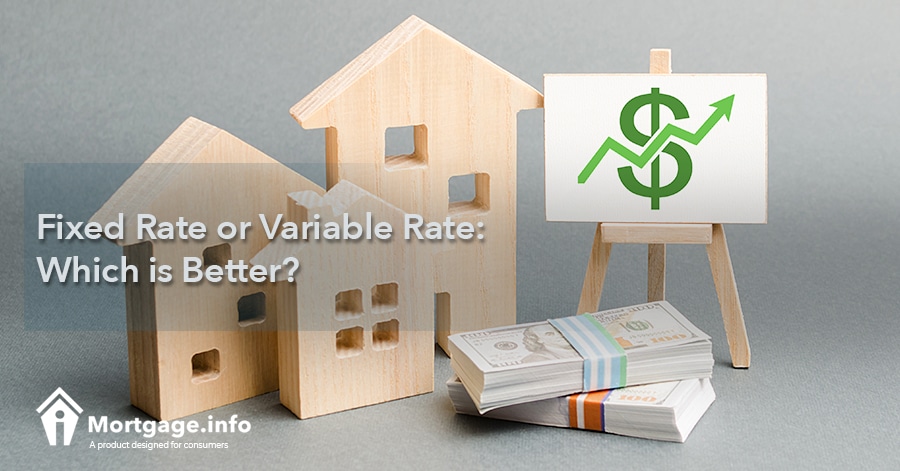One of the most important decisions you’ll make when you take out a mortgage is the interest rate. Not only do you have to worry about the number, but also what type of rate you choose. You can choose between a fixed rate and a variable rate. Keep reading to learn how to tell which might be right for you.
Looking for Current Mortgage Interest Rates? Click Here.
The Fixed Rate Defined
First, let’s take a closer look at what a fixed rate is and how it works. When you get a fixed rate, you are assigned a rate that is the rate for the life of the loan. You don’t have to worry about it fluctuating or your mortgage payment changing (as it pertains to the rate). If you escrow your taxes and insurance, your payment may change slightly based on how those costs change.
The Variable Rate Defined
The variable rate, as the name suggests, can change. Initially, it will be a fixed rate, but only for a few years. For example, a 3/1 ARM has a fixed rate for three years. After that point, the rate can adjust annually. How much it changes depends on the index and the margin. The index is something the lender chooses before funding the loan. For example, they may choose LIBOR as your index. On your rate change dates, the lender will take the current LIBOR rate and add the predetermined margin, such as 1% or 2% to the rate. That’s your new adjusted rate.
Get Matched with a Lender, Click Here.
Deciding Between the Two
So now that you know how the rates work, let’s work on asking yourself some questions to determine which rate is right for you:
- How long will you be in the home? Is this a long-term purchase or do you know that you will move in a few years? If you know that you are moving, take the variable rate loan. Typically, the introductory rate on the variable rate loans are lower than on fixed rate loans, so you’ll save money during the time that you are in the home. If you plan to stay in the home long-term, though, you are better off with a fixed rate loan.
- Do you have a stable job? If you cannot handle the fluctuations of a variable interest rate, stick with the fixed rate loan. For example, if you can just afford the payment that the lender quotes you and nothing more; you want a fixed rate loan. Then you don’t have to worry about higher payments and how you will afford it. If, on the other hand, you know your income will increase drastically after the first few years (such as occurs for doctors and lawyers), you may be better able to take the chance on the adjustable rate loan.
- How are rates right now? If interest rates are at historic lows right now, it may make sense to take the fixed rate and enjoy the low rate for the term of the loan. If you take the adjustable rate, you are at the mercy of whatever the market does in the future. Chances are that you are going to lose your low interest rate at some point.
- Do you only qualify for a variable rate loan? If your debt ratio is close to the maximum or you have a borderline credit score, you may only qualify for the variable interest rate because of the higher debt ratio. With a lower interest rate, your debt ratio will remain lower, which gives you the chance to qualify for the loan.
Think of Your Future
The bottom line is that you should think of your future. What do you see happening? Do you see yourself staying in the same career with a stable income? If so, you may not want to take a variable rate loan because of its uncertainty. If you have big plans, though, and see yourself increasing your income through the years, you may be able to enjoy the lower rate of a variable rate now and then still be able to afford the higher rate if it adjusts in the future.
Deciding between a fixed rate and variable rate loan is a personal decision. Weigh all of the pros and cons and see how they pertain to your situation. Take the time to look at historical rates and talk to professionals about what they think might happen in the future. This way you can choose the rate that is right for you for the long-term or at least as long as you are in the home.

